Illness Quotes
Most popular illness quotes

To array a man's will against his sickness is the supreme art of medicine.
Those who think they have not time for bodily exercise will sooner or later have to find time for illness.
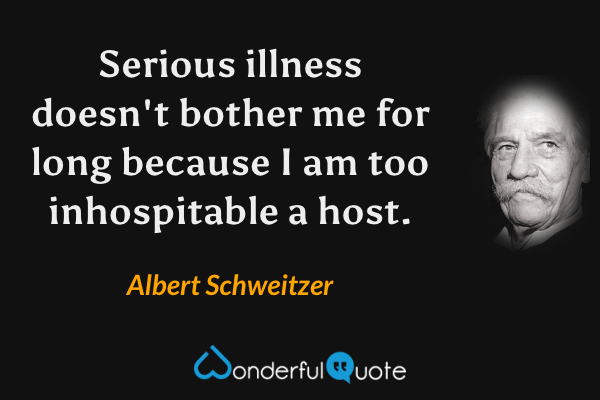
Serious illness doesn't bother me for long because I am too inhospitable a host.
If you treat a sick child like an adult and a sick adult like a child, everything usually works out pretty well.

In spite of illness, in spite even of the arch-enemy sorrow, one can remain alive long past the usual date of disintegration if one is unafraid of change, insatiable in intellectual curiosity, interested in big things, and happy in small ways.

Old age and sickness bring out the essential characteristics of a man.

One evil in old age is, that as your time is come, you think that every little illness is the beginning of the end. When a man expects to be arrested, every knock at the door is an alarm.

Old age is an illness in itself.

I enjoy convalescence. It is the part that makes the illness worth while.
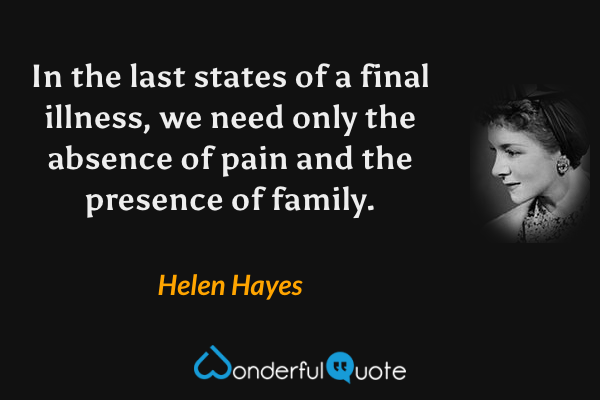
In the last states of a final illness, we need only the absence of pain and the presence of family.
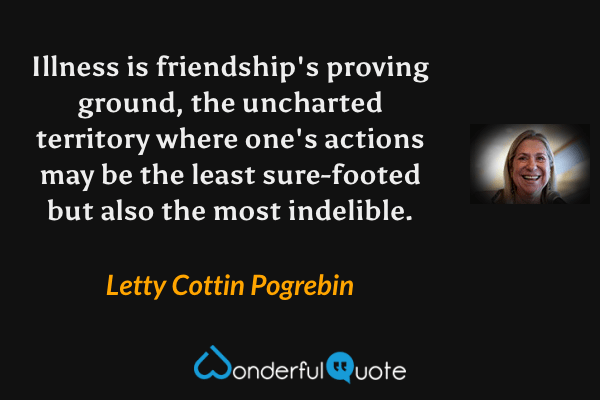
Illness is friendship's proving ground, the uncharted territory where one's actions may be the least sure-footed but also the most indelible.
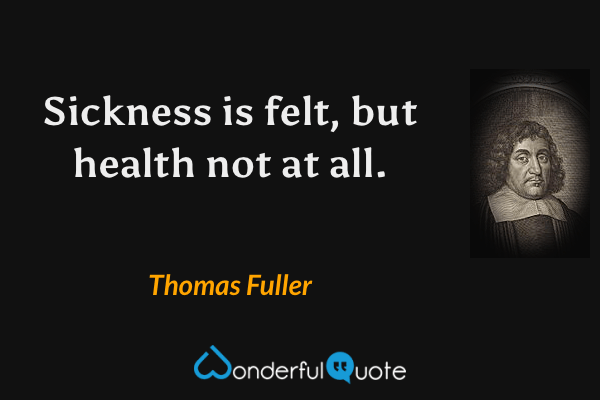
Sickness is felt, but health not at all.

The earliest sensation at the onset of illness, often preceding the recognition of identifiable symptoms, is apprehension. Something has gone wrong, and a glimpse of mortality shifts somewhere deep in the mind. It is the most ancient of our fears.

There are only two kinds of illness: those that are fatal and those that heal themselves in their proper time.

A man's illness is his private territory and, no matter how much he loves you and how close you are, you stay an outsider. You are healthy.
When illness enters a home, not only does it take hold of a body. It also weaves a dark web between hearts, a web where hope is trapped.

A critical illness is like a great permission, an authorization or absolving. It's all right for a threatened man to be romantic, even crazy, if he feels like it. All your life you think you have to hold back your craziness, but when you're sick you can let it go in all its garish colors.
The more serious the illness, the more important it is for you to fight back. You've got to mobilize all your resources—spiritual, emotional, intellectual, physical.

Can there be worse sickness, than to know That we are never well, nor can be so?
Illness is the great equalizer. It doesn't matter who you are, rich or poor, young or old, fat or thin, sick is sick.

Every sick man is a hero, if not to the world or even to the family, at last to himself.

We forget ourselves and our destinies in health, and the chief use of temporary sickness is to remind us of these concerns.

The seed of health is in illness, because illness contains information.

Those who have never been ill are incapable of real sympathy for a great many misfortunes.
Telling a story of illness, one pulls a thread through a narrow opening flanked on one side by shame and the other by trivia.
The doctor may also learn more about the illness from the way the patient tells the story than from the story itself.
To be sick and helpless is a humiliating experience. Prolonged illness also carries the hazard of narcissistic self-absorption.

What a strange distance there is between ill people and well ones.

A long illness seems to be placed between life and death, in order to make death a comfort both to those who die and to those who remain.

How sickness enlarges the dimensions of a man's self to himself.

Severe illness isolates those in close contact with it, because it inevitably narrows the focus of concern. To a certain extent this can lead to healing, but not if the circle of concern is so tight that it cannot be broken into, or out of.
Recovery from illness often seems like beginning life all over again.

Illness is in part what the world has done to a victim, but in a larger part it is what the victim has done with his world, and with himself.

We are not sensible of the most perfect health as we are of the least sickness.

Another person's illness is often harder to bear than one's own.

In a sense sickness is a place, more instructive than a long trip to Europe, and it's always a place where there's no company, where nobody can follow.
Every illness has its natural course, with which it behooves the doctor to become acquainted.

If illness is the embodiment of powerlessness, which, believe me, is true, then waiting is its temporal incarnation.

Neurosis has an absolute genius for malingering. There is no illness which it cannot counterfeit perfectly.

Illness is the doctor to whom we pay most heed; to kindness, to knowledge, we make promises only; pain we obey.
In the midst of your illness you will promise a goat, but when you have recovered, a chicken will seem sufficient.
Sickness comes on horseback and departs on foot.

Think of life as a terminal illness, because, if you do, you will live it with joy and passion, as it ought to be lived.

Illness is the opposite of freedom. It makes everything impossible. You lose so many things when you're ill.

Illness must be considered to be as natural as health.

Illness is the night-side of life, a more onerous citizenship.
Illness may precipitate a spiritual crisis. Since illness is man's reaction to disease, it is a time when men are brought face to face with the ultimate concerns of life.

I dislike helplessness in other people and in myself, and this is by far my greatest fear of illness.
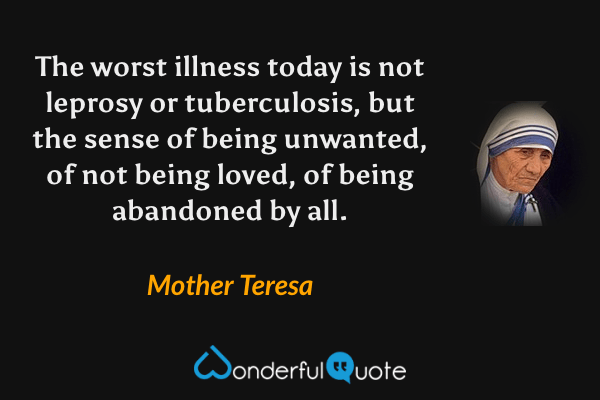
The worst illness today is not leprosy or tuberculosis, but the sense of being unwanted, of not being loved, of being abandoned by all.
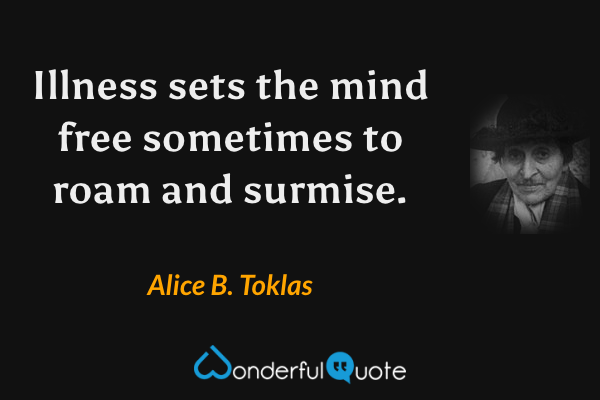
Illness sets the mind free sometimes to roam and surmise.
Stop people dying of the illnesses they die of now, and they will die of something else later on, and the slower and the costlier.
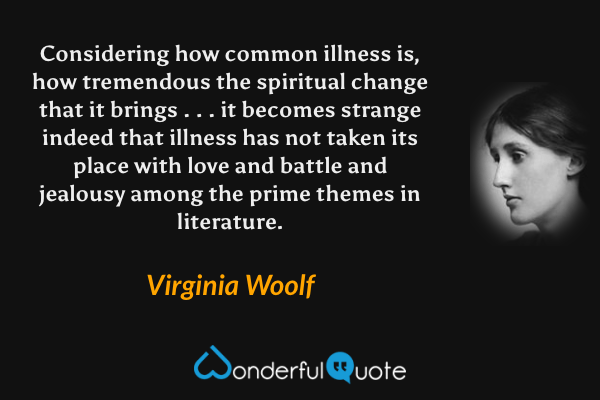
Considering how common illness is, how tremendous the spiritual change that it brings . . . it becomes strange indeed that illness has not taken its place with love and battle and jealousy among the prime themes in literature.


